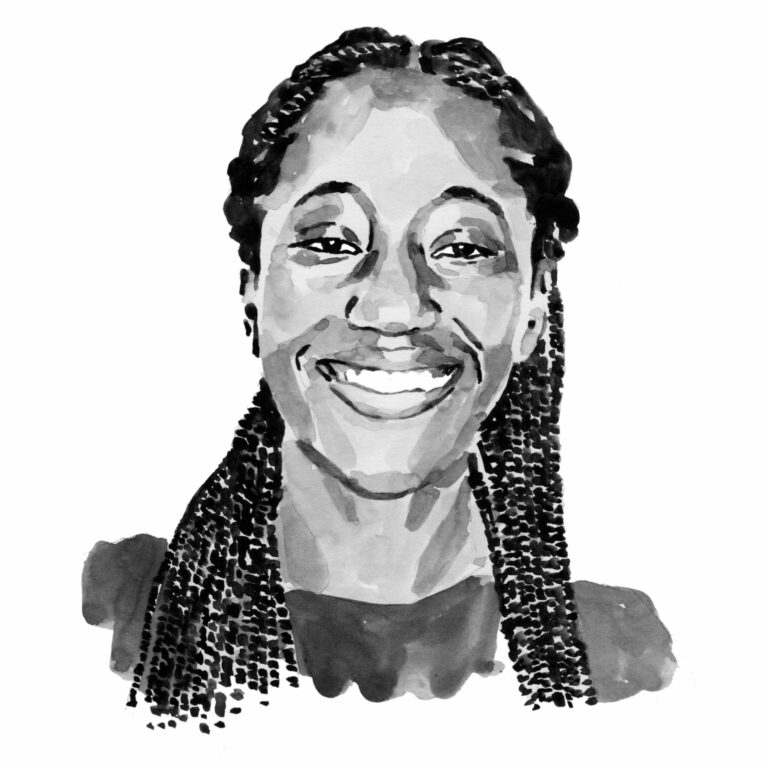Cyndi Karel Ngnah

Who I am
I am a certified diver and marine scientist with a Master’s degree in the management of aquatic ecosystems. My academic journey – five years of studying marine wildlife and conservation at university – has equipped me with extensive skills and knowledge in this field. For the past three years I have served as the head of the Environmental Education Programme at the African Marine Mammal Conservation Organisation (AMMCO). Having started as an intern, I’ve been instrumental in designing and implementing educational programmes in various coastal sites in Cameroon, including Limbe, Kribi, Dizangue and Nkam. My role also includes overseeing income-generating activities, where I work closely with local fishermen to promote sustainable practices.
Recently, I achieved certification as an open-water diver, which has further enriched my understanding of marine environments. This first-hand experience has allowed me to explore the beautiful underwater world of Cameroon and discover a vibrant ecosystem where species coexist and maintain ecological balance, in contrast to the cultural myths I grew up with that depicted the ocean as perilous.
My work has focused largely on changing the perceptions of local children, who often view marine life solely as a source of food. Most of them are afraid of the ocean. I am passionate about teaching them about the broader significance of marine ecosystems and inspiring them to become dedicated stewards of the ocean. By unveiling the true beauty and importance of our marine environments, I aim to foster a deeper appreciation for them and a commitment to conservation in the next generation.
Where I work
Our project focuses on the northern coast of Cameroon, and specifically the five key fishing villages of Batoke, Bakingili, Debundsha, Idenau and Down Beach. Heavily dependent on fishing for their livelihoods, these coastal communities are major targets for AMMCO’s projects and activities. Many conservation initiatives have been implemented by the organisation in these locations, including an environmental education programme, training in alternative livelihoods and a citizen science programme through the Siren network.
Cameroon’s coastline is 400 kilometres (250 miles) long and borders Nigeria, Equatorial Guinea and Gabon along the Atlantic Ocean. Our research is centred on a 160-kilometre (100-mile) stretch of the northern coast, where Mount Cameroon, one of Africa’s few active volcanoes, provides a dramatic backdrop. This area features critical habitats such as mangroves and coral reefs, which are essential for species like sharks and rays. Our goal is to support conservation initiatives and promote sustainable practices to preserve this unique and vital marine environment, which is currently a proposed marine protected area in Cameroon. Many people in this area depend on marine resources for their livelihoods. Thus, interacting with this community gives me a sense of hope for a prosperous and sustainable future for the next generation.
What I do
My work involves a multi-faceted approach to marine conservation and community engagement along the northern coast of Cameroon. A typical day can be filled with a range of activities, from organising and facilitating workshops to collaborating on the development of educational content. My primary focus is to increase the involvement of local communities in conservation efforts. This involves organising participatory workshops in five key villages: Batoke, Bakingili, Debundsha, Idenau and Down Beach. These two-day workshops are designed to educate local fishermen and community members about shark and ray conservation. We discuss the ecological importance of these species, provide guidelines on reducing bycatch and promote safe release practices. Engaging local leaders and collecting real-life stories are integral parts of these workshops, which inform the development of culturally relevant educational materials.
In addition, I oversee the creation of educational cartoons that aim to raise awareness of the marine environment among local children. This process begins with brainstorming sessions involving educators, scientists and community members to define key themes. We then move through stages of cartoon production, including story development, animation and review. Tools like Canva, Elevenlabs and Audacity are used to produce high-quality content that is both engaging and informative. To increase our impact, I coordinate community gatherings for the distribution and viewing of these cartoons, often aligning these events with global awareness days. Partnering with local media helps broaden our reach. Evaluating our effectiveness is crucial, so I conduct surveys before and after campaigns to measure changes in awareness and knowledge about marine conservation and sustainable fishing practices.
Overall, my work blends field experiences with strategic planning and creative content development to foster a sustainable future for marine ecosystems and the communities that depend on them.
